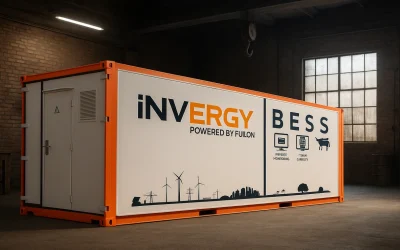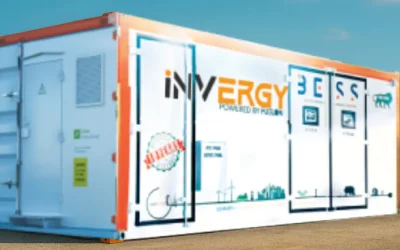In India, the need for reliable backup power is growing. Businesses face a choice between modern energy solutions. We compare two main options: Battery Energy Storage Systems (INVERGY BESS) and traditional diesel generators.
It’s important to know how much they cost and how reliable they are. These factors affect how well they meet energy needs for different businesses. By looking at INVERGY BESS and diesel generators, we aim to help you choose the best backup power solution for your needs.
Key Takeaways
- INVERGY Bess offers advanced technology for energy storage and backup power.
- Cost-effectiveness is a vital consideration when choosing between energy solutions.
- Diesel generators have been a traditional choice but may not meet growing energy needs.
- Reliability impacts business operations and should be evaluated carefully.
- Assessing emissions is key for sustainable energy choices.
- Understanding operational costs helps in budgeting for energy solutions.
Introduction to Energy Alternatives
In India, businesses are looking for reliable and green power options. High energy costs and tough environmental rules push them to find new ways. Battery Energy Storage Systems (BESS) and diesel generators are top choices, each with its own benefits.
BESS helps store energy for when it’s needed most, balancing loads and cutting down on grid use. Diesel generators, on the other hand, are tried and true for backup power. Knowing the strengths of BESS and diesel generators helps companies choose better, greener, and cheaper options.
Understanding BESS
BESS is a big step forward in energy solutions. It’s a top-notch battery energy storage system that boosts efficiency, mainly with renewable energy. As energy needs rise, knowing about BESS is key for companies wanting to improve their work.
What is BESS
BESS is a cutting-edge battery energy storage system for better energy management. It captures and stores energy from green sources, letting businesses use it when they need it. Adding BESS to energy systems cuts down on traditional grid power use. It also makes operations more stable with changing energy needs.
Key Features of INVERGY BESS
The standout features of INVERGY BESS make it a great pick for green-focused businesses. Key points include:
- Scalability: It can be adjusted to meet different energy needs, from small to big.
- Efficiency: INVERGY BESS stores energy well, making sure it’s used right.
- Low Emissions: It uses renewable energy, helping companies cut down on carbon emissions.
- Reliable Power Supply: It keeps power flowing, cutting down on outages and keeping work going.
Diesel Generators: A Traditional Approach
Diesel generators have been a trusted source of energy for many years. They provide vital backup power when needed. This overview covers their key functions, benefits, and common use in different fields. Yet, they face issues with emissions and fuel costs.
Overview of Diesel Generators
Diesel generators work by turning fuel into mechanical energy through a combustion engine. This allows them to produce electricity when it’s needed. The benefits of diesel generators include:
- High reliability and performance
- Robust mechanical design, suitable for harsh environments
- Long run times compared to other types of generators
These qualities make diesel generators a top choice for backup power in many areas.
Common Applications of Diesel Generators
Diesel generators are used in various settings, including:
- Construction Sites: They provide stable power for tools and equipment.
- Healthcare Facilities: They ensure hospitals have constant power for essential systems.
- Manufacturing Plants: They help keep operations running during power outages.
In these sectors, the need for reliable power shows how important diesel generators are. They help keep operations running smoothly.
Cost Comparison: BESS vs Diesel Generators
When businesses look for backup power, they need to think about costs. Battery Energy Storage Systems (BESS) like INVERGY and diesel generators have different costs. Knowing these can help businesses make better choices.
Initial Investment Analysis
BESS costs more upfront than diesel generators. This is because BESS uses new technology and systems. Here’s a look at the costs:
| Energy Source | Initial Investment (INR) |
|---|---|
| BESS (INVERGY) | 15,00,000 |
| Diesel Generators | 8,00,000 |
Operational & Maintenance Costs (O&M)
BESS is cheaper to run over time. Diesel generators need fuel, service, and parts. BESS has lower costs because it has fewer parts and no fuel needs. Here’s how they compare:
| Cost Type | BESS (Annual O&M Costs in INR) | Diesel Generators (Annual O&M Costs in INR) |
|---|---|---|
| Fuel Costs | 0 | 2,00,000 |
| Maintenance | 30,000 | 80,000 |
| Total Annual O&M Costs | 30,000 | 2,80,000 |
Businesses should look at both the initial cost and ongoing expenses. This helps them choose the best energy solution. With growing energy needs, it’s key to think about the total cost.
Reliability Factors in Energy Solutions
Businesses focus a lot on energy reliability, looking at BESS and diesel generators’ uptime. In today’s fast-paced world, steady power is key for smooth operations. Knowing how often these systems work shows their efficiency and strength.
Evaluating Uptime for BESS and Diesel Generators
Uptime is a key factor when comparing BESS to diesel generators. BESS systems, like BESS, have little downtime because they store energy quickly. On the other hand, diesel generators might face issues like maintenance or fuel problems, affecting their uptime. Here’s a comparison of their uptime under different conditions.
| Energy Source | Typical Uptime | Common Downtime Factors |
|---|---|---|
| BESS | 95% – 99% | Battery degradation, software updates |
| Diesel Generators | 85% – 90% | Fuel shortages, mechanical failures |
How Resilience Affects Business Operations
Reliability is more than just having power; it’s about a business’s overall strength. A good energy solution can handle big loads and emergencies well. Companies using BESS face fewer problems, making their work more efficient.
Having a steady power supply helps businesses run smoothly. But, diesel generators can be unpredictable, posing risks during important times.
Emissions and Environmental Impact
Choosing the right energy source is key. It involves looking at emissions and their impact on the environment. Diesel generators pollute the air, releasing harmful substances. As businesses focus on being sustainable, knowing how emissions affect their choices is vital.
The Role of Emissions in Choosing Energy Sources
Emissions harm air quality and health. Companies must pick energy sources that cut down on emissions. Laws and social responsibility push businesses to care for the environment. INVERGY BESS is a good choice because it offers clean energy without emissions.
How BESS Reduces Carbon Footprint
INVERGY BESS cuts down on carbon emissions from power generation. It uses solar and wind energy, making the environment cleaner. This tech stores energy well, reducing waste and emissions from diesel generators. Using BESS helps companies meet global sustainability goals and boosts their reputation.
Fuel Savings: A Comparative Analysis
Fuel savings are a big plus when comparing INVERGY BESS to diesel generators. With fuel prices always changing, it’s key to know how efficient each is. This helps businesses find the best, most cost-effective energy solutions.
Comparing Fuel Efficiency of BESS and Diesel Generators
INVERGY BESS systems are built for top-notch energy conversion. They beat traditional diesel generators in fuel efficiency. This means big savings for companies looking for the latest in energy tech.
The table below shows how each system stacks up in fuel efficiency:
| Energy Source | Fuel Efficiency (%) | Annual Fuel Costs (INR) |
|---|---|---|
| INVERGY BESS | 90 | Approximately 50,000 |
| Diesel Generator | 70 | Approximately 80,000 |
Cost Savings Over Time with INVERGY BESS
Choosing INVERGY BESS means long-term savings for businesses. Its high fuel efficiency cuts down on yearly fuel costs. This leads to big savings over time, making it a smart switch from diesel generators.
Companies using BESS technology see their operational costs drop. This boosts their market position and gives them a competitive edge.
Implementation Considerations for Businesses
Businesses are turning to BESS to boost their energy plans. Knowing what backup power they need is key. It makes sure they run smoothly and efficiently.
Looking closely at their needs helps spot when they might lose power. This guides them to the right energy solution.
Assessing Business Needs for Backup Power
Businesses must think about their power needs. Important things to look at include:
- How long power outages last in their area
- Systems that must keep running
- When they use the most power
By looking at these, companies can see how BESS can help. It makes sure they have the power they need, when they need it.
Best Practices for Integrating INVERGY BESS
Adding INVERGY BESS to their systems needs careful planning. Here are some steps to make it work well:
- Do a full check of the site to see what space and connections are needed.
- Make a detailed plan for when and how things will be done.
- Train staff on the new systems and how to use them.
By following these steps, businesses can smoothly add energy solutions. This makes them more resilient and sustainable.
Case Studies and Real-world Applications
In India, the energy scene is changing fast. INVERGY BESS is becoming a top choice in many fields. It’s great for making energy systems work better and greener.
Stories from real places show how well INVERGY BESS works. They talk about how it makes things run smoothly and saves money. It’s also good for the planet.
Successful INVERGY BESS Implementations in India
Many companies in India have added INVERGY BESS to their energy plans. For example, a big factory cut its energy bills by 30%. They switched from old diesel generators to INVERGY BESS
This change gave them steady power and better energy use. It shows how well NVERGY BESS manages energy. In Bangalore, a tech center used INVERGY BESS to cut costs and improve reliability.
Challenges Faced by Diesel Generator Users
Diesel generators are facing big problems. The cost of fuel is going up, and they break down a lot. This means expensive fixes and lost time.
There’s also more pressure to cut down on pollution. This makes using diesel generators harder. Many are looking at INVERGY BESS as a better option. It’s cleaner and saves money.
| Company | Application | Cost Reduction | Key Benefits |
|---|---|---|---|
| Manufacturing Firm | Energy Supply | 30% | Uninterrupted Power, Load Management |
| Tech Hub, Bangalore | Peak Shaving | 25% | Operational Efficiency, Reduced Downtime |
Future Trends in Energy Solutions
The world of energy solutions is changing fast. New technologies in BESS and big changes in the diesel market are leading the way. We’ll look at the trends that are making these changes happen. These trends focus on making things more sustainable, efficient, and cost-effective.
Innovations in BESS Technology
BESS technology is getting better and better. It’s becoming more efficient, holding more energy, and lasting longer. Here are some key areas to watch:
- Advanced Battery Chemistry: New battery types like solid-state and lithium-silicon are more powerful and charge faster.
- Smart Integration: Using IoT and AI helps keep systems running smoothly and predicts when they might need maintenance.
- Scalability: BESS systems can grow with your needs. This means you can start small and add more as you go.
Shifts in Diesel Generator Market Dynamics
The diesel generator market is changing a lot. This is because of new rules and the push for cleaner energy. Here are some important points:
- Regulatory Pressures: Laws are getting stricter on emissions, pushing people towards cleaner options.
- Market Competition: BESS technology is getting better and cheaper, making diesel generators less popular.
- Energy Transition: The world is moving towards renewable energy. This is making businesses think differently about backup power.
| Category | BESS Innovations | Diesel Generator Market Shifts |
|---|---|---|
| Efficiency | High energy density batteries | Increased efficiency standards |
| Environmental Impact | Reduction in carbon emissions | Adoption of cleaner technologies |
| Cost | Decreasing installation costs | Rising operational costs due to regulations |
Conclusion
Looking at energy alternatives, INVERGY BESS stands out over traditional diesel generators. It offers big cost savings and is more reliable. INVERGY BESS is also a greener choice, helping businesses cut down on carbon emissions.
Our research shows that INVERGY BESS boosts operational efficiency. It also prepares businesses for the changing energy world. These benefits are key in today’s market, where being green is a must for success.
Choosing INVERGY BESS over diesel generators is wise for the future. It helps businesses stay financially strong while protecting the environment. This sets a good example for future generations.





0 Comments